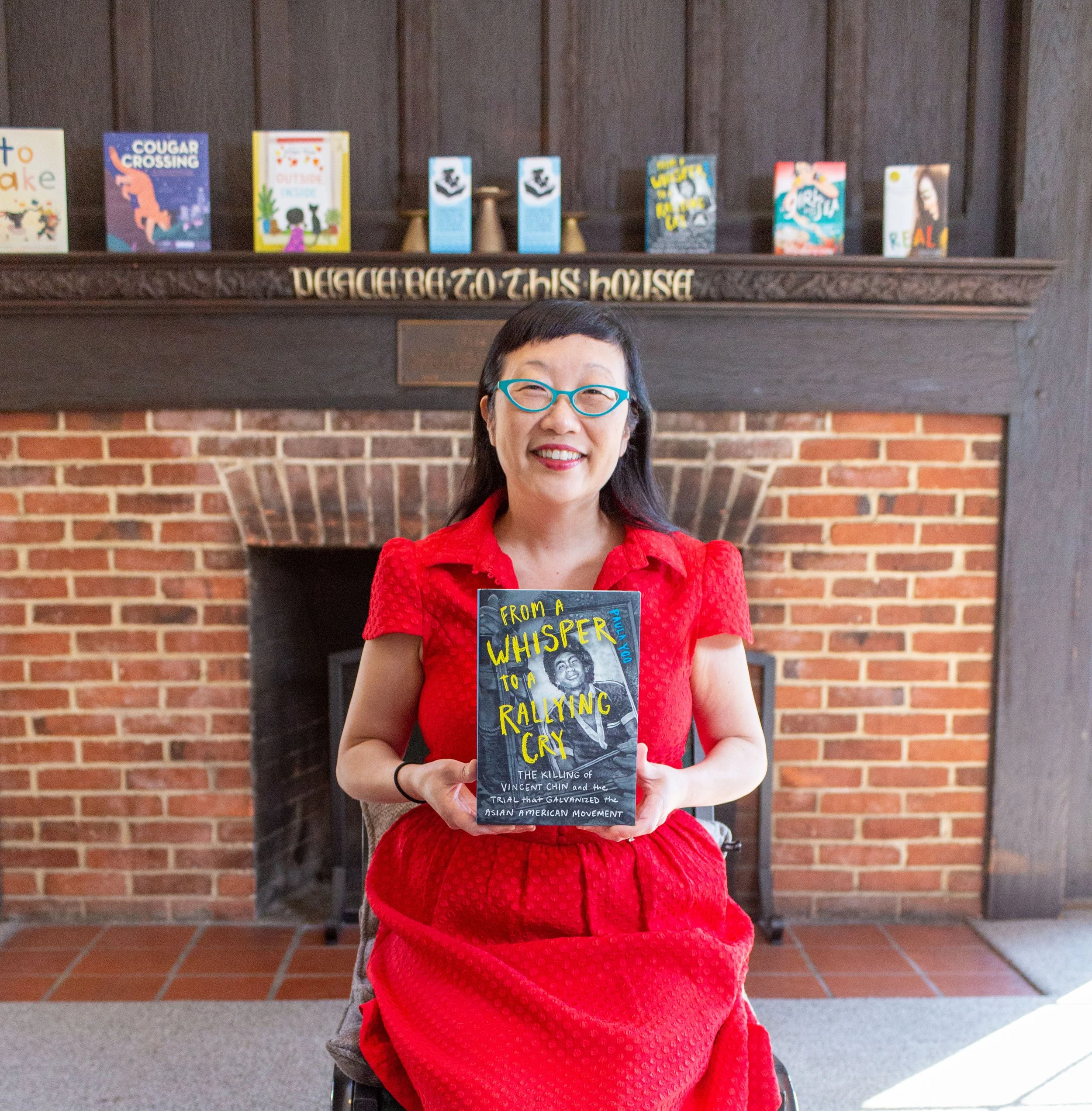2022 CLCSC Awards - Acceptance Speech by Winner Paula Yoo
Winners Paula Yoo, Carol Cujec, Peyton Goddard, and Meeg Pincus have graciously provided copies of their speeches from the CLCSC Awards Ceremony held on November 12, 2022 at Throop Church in Pasadena, CA.
Peggy Miller Award for Young Adult Literature
From a Whisper to a Rallying Cry by Paula Yoo
Paula Yoo: Thank you to everyone at the Children’s Literature Council of Southern California. I am grateful and honored to receive this year’s Peggy Miller Award for Young Adult literature. I would also like to thank my family and my editor Simon Boughton and everyone at Norton Young Readers and to my agent Tricia Lawrence of the Erin Murphy Literary Agency. And I am forever grateful for Vincent Chin’s family, friends, and everyone involved in the legal case who spoke to me for my book.
Recent studies show that reading plays a huge role in developing empathy in children and teenagers, allowing them to connect with different points of view and form a universal connection to other people’s experiences.
But growing up, my point of view and my human experience did not seem to exist in books. Asian American history and literature were seldom taught in-depth at my schools. It was as if we did not exist. As a result, I graduated high school in 1987 with a desire to fill in the gaps. I am mostly self-taught when it comes to Asian American history, literature and pop culture. When I was in college, the Academy Award nominated documentary feature, Who Killed Vincent Chin? was my first introduction to his story.
“Recent studies show that reading plays a huge role in developing empathy in children and teenagers, allowing them to connect with different points of view and form a universal connection to other people’s experiences.
”But growing up, my point of view and my human experience did not seem to exist in books.”
So in June 1993, when I was offered a job as a full-time reporter at The Detroit News, the first question to pop into my head was:
But what about Vincent Chin?”
Here I was, a 24-year-old Korean American woman who drove a Nissan, about to move to Michigan, home of the Big Three – Ford, GM and Chrysler – barely a decade after the killing of Vincent Chin.
On June 19, 1982, the 27-year-old Chinese American was beaten to death with a baseball bat by two white autoworkers on the night of his bachelor party at a nightclub in Highland Park, just outside Detroit. One day after Vincent’s wedding was supposed to take place, his bride, family and friends attended his funeral instead.
Vincent Chin’s killing happened at the height of anti-Asian racism as competition from Japan’s import cars was unfairly blamed for the mass layoffs throughout the American auto industry. Although both killers pled and were found guilty of manslaughter, a sympathetic white male judge gave them 3 years of probation and a $3000 fine each.
This outraged the Asian American community, who united together and protested across the country. As a result, Vincent Chin’s killing became the first federal civil rights trial on the behalf of an Asian American in this country.
He became a symbol of justice for the Asian American community. This year is also the 40th anniversary of his death. His name, however, soon disappeared until the pandemic. Vincent Chin’s story has made front page news in the past two years because of the haunting similarities between his case and today’s over 10,000 anti-Asian hate crimes due to the pandemic. Vincent Chin’s story was also compared to the horrific spa killings in Atlanta in March 2021 when 8 people were shot to death. Although six of the victims were of Asian descent, the sheriff at the time said that this was not considered a racist hate crime… just like what the original judge had said in the Vincent Chin case.
My family, friends and I have also experienced anti-Asian racism because of the pandemic. During the early days before the vaccines were available, my relatives reported passengers requesting to be seated away from them on airplanes. I too have experienced people avoiding me in public, afraid I might infect them. People in cars shouted anti-racist slurs at me as I walked down the sidewalk.
But just like 40 years ago, the Asian American Pacific Islander community fought back. Again. “Stop AAPI Hate” rallies were held across the country, just like the “Justice for Vincent Chin” protests in 1982. As a result, Congress passed the COVID-19 Hate Crimes Act on May 18, 2021… the same day as Vincent Chin’s birthday. He would have been 66 years old. President Biden signed it into law two days later.
This is why Vincent Chin’s story must be told. His name reminds us never to be complacent whenever we witness injustice. We must always speak out and fight back in solidarity against all forms of hatred, discrimmination and racism for ALL our communities. That is what his legacy has taught us.
Finally, I want to leave you with this one statistic. A recent study found that one out of four Asian American Pacific Islander teenagers have reported being verbally or physically harassed and bullied because of the pandemic. Imagine if our Asian American history and literature had been taught in depth in our K-12 schools this whole time. That statistic could have been zero.
Writing about Asian American history for young readers is an honor and privilege that I do not take lightly. I don’t want children and teenagers to grow up like me where much of our history was ignored and often erased. Because our stories, our history, our contributions, and our voices matter.
Thank you again to the Children’s Literature Council of Southern California for the Peggy Miller Award, and most importantly, thank you for your continued education and advocacy for our young readers.
© Paula Yoo, 2022
Photo Credit: Josh Steichmann


